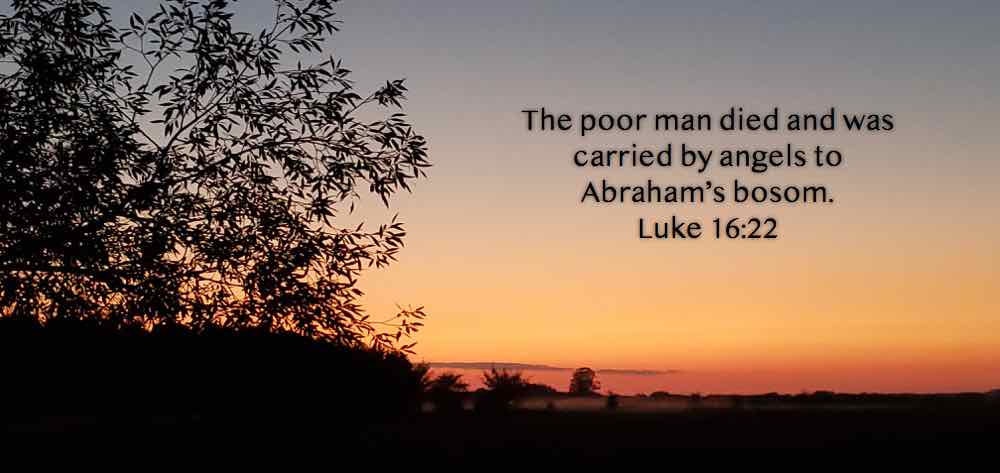September 28, 2025

Luke 16:19–31 ESV
“There was a rich man who was clothed in purple and fine linen and who feasted sumptuously every day. And at his gate was laid a poor man named Lazarus, covered with sores, who desired to be fed with what fell from the rich man’s table. Moreover, even the dogs came and licked his sores. The poor man died and was carried by the angels to Abraham’s side. The rich man also died and was buried, and in Hades, being in torment, he lifted up his eyes and saw Abraham far off and Lazarus at his side. And he called out, ‘Father Abraham, have mercy on me, and send Lazarus to dip the end of his finger in water and cool my tongue, for I am in anguish in this flame.’ But Abraham said, ‘Child, remember that you in your lifetime received your good things, and Lazarus in like manner bad things; but now he is comforted here, and you are in anguish. And besides all this, between us and you a great chasm has been fixed, in order that those who would pass from here to you may not be able, and none may cross from there to us.’ And he said, ‘Then I beg you, father, to send him to my father’s house— for I have five brothers—so that he may warn them, lest they also come into this place of torment.’ But Abraham said, ‘They have Moses and the Prophets; let them hear them.’ And he said, ‘No, father Abraham, but if someone goes to them from the dead, they will repent.’ He said to him, ‘If they do not hear Moses and the Prophets, neither will they be convinced if someone should rise from the dead.’ ”
Discussion Questions:
This parable is often used as evidence that after death a person either goes to heaven or hell. Is this accurate?
- What is Abraham’s bosom?
- What does the word “Hades” refer to?
- What does “torment” refer to?
Discussion Summary:
Abraham’s bosom can be identified with the death condition. In the Old Testament, the faithful were said to be “gathered to their fathers” (Genesis 15:15; 1 Kings 2:10). Abraham bears a special place as a father because he is also called the “father of the faithful: (Galatians 3:7-9). Leaning on Abraham’s bosom describes the act of reclining at feast with him(John 13:23,25). This points to the hope of the faithful to join with the father’s in the joys of God’s kingdom after the resurrection (Luke 13:28,29).
“Hades” is the Greek word for the underworld. It corresponds to the Hebrew word “sheol” which was the place or condition of death prior to judgement. In this parable, addressed to the religious leaders, hades describes the condition of the nation that Jesus has already pronounced against if in Luke 10:13-15. Verse 15 reads, “And you Capernaum, will you be exalted to heaven? You shall be brought down to Hades.”
In Deuteronomy 32:15-27 a judgement is pronounced against the inhabitants of Judea as the people had forgotten and forsaken God. The fullness of this judgement is described in verse 22, “For a fire is kindled by my anger, and it burns to the depths of Sheol.”
Torment in the parable conveys the same idea as when it is used in Revelation. In Revelation 14:11 and in 18:8,15 it shows to others that a judgement has taken place. The symbol associated with this fiery judgement is smoke. This punishment by God is revealed to all.
Leave a Reply